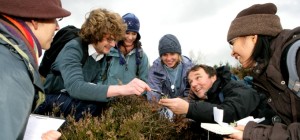Last year Dr M was struck by an article entitled“The Death of Botany” in the “Rant and Reason” section of the June 2013 edition of the magazine of the British Ecological Society. In this rant, Dr Markus Eichhorn, botanist at the University of Nottingham, bemoaned the loss of botany degree programmes from UK Universities. Markus highlighted the extreme irony that, although botany is essentially extinct as a degree programme in Britain, botanical skills remain in high demand from employers in a wide range of ecology and conservation organisations.
Dr M agreed with Markus in many aspects (you can read the earlier post here), but overall was pretty sure that his report of the death of botany was greatly exaggerated!
Dr M immediately got in touch with the associate editor, Emma Sayer, and agreed to write an article in response, here is the text of that article (with only slight embellishments!) which has just appeared in the March 2014 BES Bulletin:
“Botany is here to stay!
Not only are we a nation of gardeners and plant-lovers, we are a global species for which plants are, and always have been, a source of wonder and joy as well as physical and aesthetic nourishment. OK, undergraduate botany degrees in the UK may be dead in the water, but the extinction of the botany degree per se does not mean botany is dead, there remain a number of Masters courses in the field including at University of Reading. Some people are inclined to rename botany as plant sciences but I consider this is immaterial and as far as I am concerned, botany remains the best ‘B’ word we have!
“I studied Botany at Bangor in the 1970s and it was a different world. I recall the buzz of being part of a school of plant biology (not “botany” even then!) full of eminent scientists and a vibrant PhD community. It was a world where the University library had books, journals and microfiches, rather than internet connections and coffee shops. Where lecturers used slide projectors and OHP transparencies not PowerPoint, a world less exercised by the REF and endless administrative responsibilities. A lost world, not better or worse, just different and very last-century! Importantly though, it was a world of field and lab classes where students were taught plant ID skills as well as honing them in their own time with friends out in the countryside.”
“I still contend that the world abounds with budding botanists and a class full of students can be inspired by the significance, fascination and beauty of plants. However, the modern botanical toolkit must embrace the new century: the internet and social media, fieldwork and outreach. Botany will never die if we continue to write inspirational books and web resources, and get universities into schools and schools into universities.”
“Last year, I launched my botanical website www.drmgoeswild.com [I think you know it!] and developed my concept of eXtreme botany as an experiment in spreading my passion for plants and field botany more widely. I am convinced that if we can get people interested in local plants they will find a greater personal connection with their environment and their lives will be enriched, the more this happens the bigger the impact.”
“So, eXtreme botany is about:
- the intrinsic fascination and beauty of plants;
- how exciting and fun field botany can be;
- enhancing plant ID skills to the next level;
- identifying plants under extremely challenging conditions;
- giving people the tools they need to become extremely knowledgeable about plants;
- reaching out to the next generation using social media and video;
- giving other teachers the skills they need to communicate the joy of plants.”
“eXtreme botany builds on existing initiatives. Important and established players here are the Science and Plants for Schools project (SAPS), the Gatsby Plants project and the OPAL project. Another example is the INQUIRE project – a three-year EU-funded project involving 14 botanical gardens, and 17 partners in 11 European countries. The aim is to act as catalyst by training and supporting increasing numbers of teachers and educators.”
” Increasingly important for botanical outreach is the Botanical Society of Britain and Ireland (BSBI) with key events ranging from the annual New Year’s plant hunt to the Threatened Plants Project and involvement in the Survey of Plants and Lichens Associated with Ash project (SPLASH).”
“Dr M contends: Botany will never die if we can continue to inspire teachers and students in the field (learning outside the classroom) and show that botany is not only important and fascinating but also eXtremely exciting and wildly fun!”
Please contact Dr M: with your own stories, observations and reactions, it’s the hottest topic in botany today!
Dr M on tour with eXtreme botany: @ UK PlantSci 2014 in York, 31 March – 1 April 2014.
References and further enquiry:
Gatsby Plants project http://www.gatsbyplants.leeds.ac.uk/news.php
The INQUIRE Project http://www.inquirebotany.org/en/
The Threatened Plants Project http://www.bsbi.org.uk/tpp.html
The Survey of Plants and Lichens Associated with Ash www.brc.ac.uk/splash
Featured image at the top of this post shows Dr M and MSc students going wild about plants at Bearwood College, Berkshire.
Image below shows Dr M enthusing with plants and students at Wildmoor Heath, Berkshire (image credit: University of Reading).



